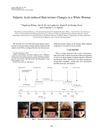 10 citations,
October 2016 in “Epilepsy & behavior”
10 citations,
October 2016 in “Epilepsy & behavior” Levetiracetam often causes behavioral issues, while oxcarbazepine is more likely to cause sleepiness in epilepsy patients.
 20 citations,
December 2011 in “Journal of inherited metabolic disease”
20 citations,
December 2011 in “Journal of inherited metabolic disease” Valproic acid treatment increases a specific acid in urine by blocking an enzyme, possibly causing skin rash and hair loss.
22 citations,
September 2008 in “Brain & development” Biotin supplements increased biotin levels but did not significantly prevent hair loss in rats on valproic acid.
36 citations,
October 2008 in “European journal of paediatric neurology” Valproic acid treatment may cause temporary hair loss due to reduced zinc and biotinidase levels, which tend to normalize after 6 months.
 13 citations,
January 2007 in “Epilepsia”
13 citations,
January 2007 in “Epilepsia” Valproic acid can cause reversible hair curling and persistent hair thinning.
15 citations,
May 2006 in “Brain & development” Valproic acid may cause hair loss by reducing biotinidase enzyme activity in rats.
November 2023 in “Children” Many pediatric epilepsy patients experience preventable severe adverse drug reactions, especially with certain medications and risk factors.
 6 citations,
June 2013 in “Toxicological Research”
6 citations,
June 2013 in “Toxicological Research” Topical Valproate is safe for human skin and unlikely to cause irritation.
 68 citations,
March 2018 in “Biomaterials”
68 citations,
March 2018 in “Biomaterials” Tiny needles with valproic acid can effectively regrow hair.
 34 citations,
January 2008 in “International Review of Neurobiology”
34 citations,
January 2008 in “International Review of Neurobiology” Epilepsy and certain epilepsy drugs can lead to reproductive problems in women, but changing medication might improve these issues.
 21 citations,
October 2017 in “Journal of Investigative Dermatology”
21 citations,
October 2017 in “Journal of Investigative Dermatology” The document concludes that understanding dermal papilla cells is key to improving hair regeneration treatments.
 November 2024 in “Journal of Cosmetic Dermatology”
November 2024 in “Journal of Cosmetic Dermatology” Valproic acid microemulsions improve skin delivery compared to regular solutions.
 April 2024 in “Lečaŝij vrač”
April 2024 in “Lečaŝij vrač” Valproic acid can cause low platelet counts, especially at high doses or in elderly patients.
January 2024 in “Neuroscience Applied” Oxytocin receptor changes in hair cells may help identify autism, especially in males.
16 citations,
May 2009 in “Journal of child neurology” Valproic acid does not change biotinidase enzyme activity in children's blood.
1 citations,
October 2023 in “Animals” Certain DNA regions in alpacas are linked to fiber diameter.
 2 citations,
April 2023 in “Curēus”
2 citations,
April 2023 in “Curēus” Valproic acid can cause muscle damage and liver issues, which improve after stopping the drug.
 13 citations,
November 2013 in “Seizure: European Journal of Epilepsy”
13 citations,
November 2013 in “Seizure: European Journal of Epilepsy” Levetiracetam may cause hair loss, which can potentially reverse with lower doses or stopping the drug.
 April 2024 in “Remedium Journal about the Russian market of medicines and medical equipment”
April 2024 in “Remedium Journal about the Russian market of medicines and medical equipment” Pharmacy workers need more education to better help people with hair loss.
 12 citations,
December 2020 in “Frontiers in Cell and Developmental Biology”
12 citations,
December 2020 in “Frontiers in Cell and Developmental Biology” The review found that the way Platelet-Rich Plasma is made varies a lot, which can change the results of medical treatments.
 11 citations,
January 2016 in “Bipolar Disorder”
11 citations,
January 2016 in “Bipolar Disorder” Valproate is a mood stabilizer for bipolar disorder but has side effects and risks, especially during pregnancy.
4 citations,
January 2019 in “PubMed” Low dose valproate in epileptic children mainly causes weight gain and other non-life-threatening side effects.
11 citations,
January 2018 in “International journal of trichology” Valproate can cause hair loss and changes in hair appearance, but may help regrow hair when applied topically.
9 citations,
January 2015 in “Indian Journal of Pharmacology/The Indian journal of pharmacology” Higher doses of the medication valproate can cause hair loss, which may stop when the dose is lowered or the medication is stopped.
 4 citations,
August 2001 in “Epilepsia”
4 citations,
August 2001 in “Epilepsia” Treating epilepsy is complex, requiring careful drug choice and patient adherence to manage seizures and side effects.
 5 citations,
August 2018 in “European Psychiatry”
5 citations,
August 2018 in “European Psychiatry” Some psychiatric drugs can cause severe hair loss, especially valproic acid, and it's more likely in women or those with thyroid issues or past hair loss.

Topical valproate can effectively promote hair growth.
 2 citations,
April 2017 in “Asian Journal of Psychiatry”
2 citations,
April 2017 in “Asian Journal of Psychiatry” Valproic acid can cause hair loss when taken orally but may promote hair growth when applied topically.
 53 citations,
February 2020 in “Expert Opinion on Pharmacotherapy”
53 citations,
February 2020 in “Expert Opinion on Pharmacotherapy” Finasteride and minoxidil work best together for hair loss.
 December 2021 in “Black sea journal of health science”
December 2021 in “Black sea journal of health science” Valproic acid can cause a rare allergic reaction leading to fluid around the lungs and heart, which is treatable by changing medication.



















